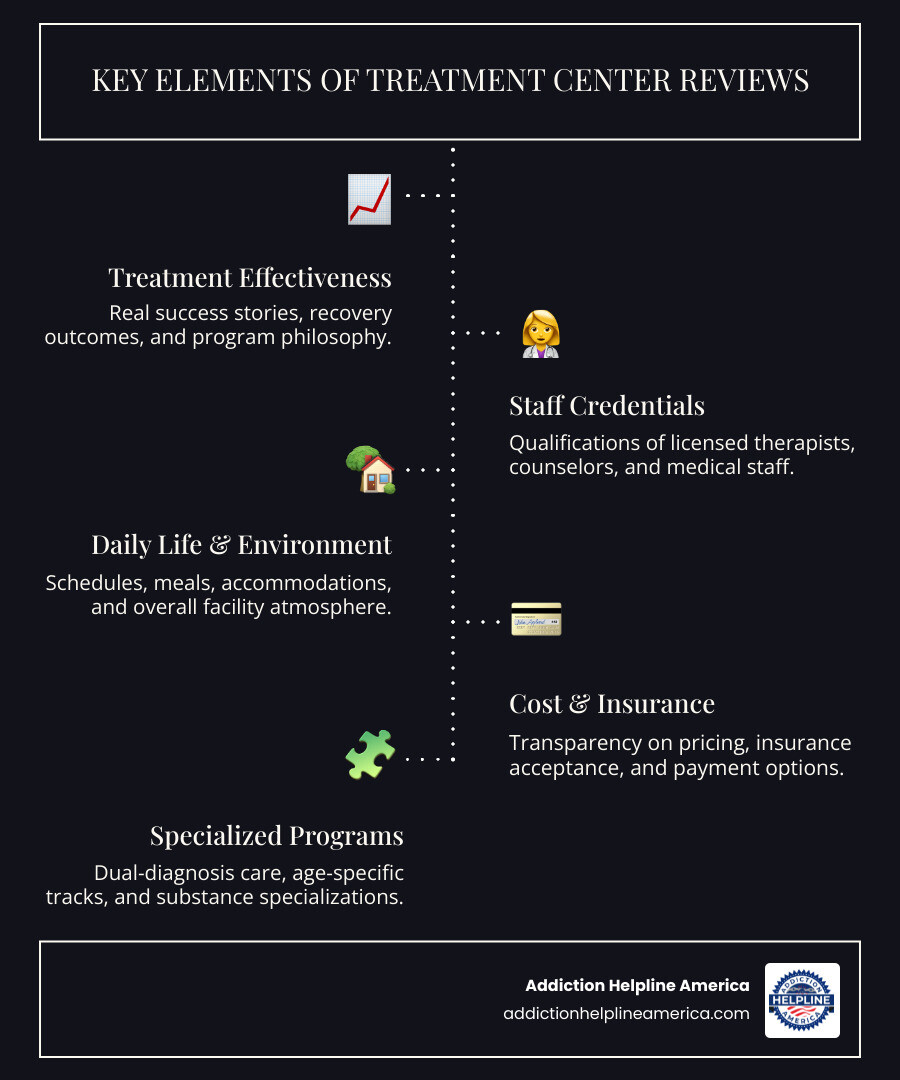
Why Treatment Center Reviews Matter More Than Ever
Treatment center reviews provide the real-world insights you need when choosing the right addiction recovery program. With thousands of facilities across the country, reviews help you cut through marketing promises to understand what treatment actually looks like day-to-day.
Key information found in treatment center reviews:
- Treatment effectiveness ratings – Real success stories and recovery outcomes
- Staff quality and credentials – Licensed therapists, counselors, and medical professionals
- Daily life details – Schedules, meals, accommodations, and facility environment
- Cost transparency – Insurance acceptance, payment options, and billing practices
- Specialized programs – Dual-diagnosis care, age-specific tracks, and substance specializations
Reviews matter because they come from people who’ve walked the same path you’re considering. As one River Oaks Treatment Center alumnus shared: “Everyone was so welcoming and you almost feel at home the second you walk in the door.” These authentic experiences help you understand not just what a facility offers, but how it feels to be there during one of the most challenging times in your life.
The research shows significant rating differences across platforms – River Oaks scores 3.6 stars on one site but 4.6 on another with different review populations. This highlights why reading multiple sources gives you a fuller picture.
At Addiction Helpline America, we’ve helped thousands of individuals and families steer treatment center reviews to find programs that match their unique needs and circumstances. Our experience shows that informed decisions lead to better treatment outcomes and lasting recovery.
Why Treatment Center Reviews Are a Crucial First Step
Searching for addiction or mental health treatment can feel like standing at the edge of an ocean – vast, overwhelming, and uncertain. You’re making one of the most important decisions of your life, and the stakes couldn’t be higher. This is exactly why treatment center reviews become your compass in this journey.
Think about it: when you’re choosing a restaurant, you check reviews. When you’re booking a hotel, you read what other guests experienced. So when you’re choosing a place that could literally save your life or the life of someone you love, shouldn’t you want to hear from people who’ve actually been there?
Treatment center reviews offer something marketing brochures simply can’t – unfiltered insight from real people who’ve walked this path before you. They help you set realistic expectations about what treatment actually looks like day-to-day, not just what it promises to be. Instead of comparing glossy websites, you can compare real experiences and find a program that truly matches your personal needs.
The Power of Shared Experiences
There’s something incredibly powerful about hearing from someone who has been exactly where you are right now. When someone shares their story in a treatment center review, they’re not just rating a service – they’re opening their heart about one of the most vulnerable times in their life.
These personal stories can spark hope when you need it most. Reading about someone who felt “welcomed” and found the tools to “deal with life” isn’t just encouraging – it’s proof that recovery is possible. One person shared how they went from “basically ruining my life, my family, my children” to finding their “way home.” That’s not marketing speak – that’s real change.
These shared experiences help you feel less alone in what can be an isolating struggle. When you read about Lauren, who tried treatment multiple times before finding success, or Paschal, who was initially resistant but eventually found sobriety and built a stable life with a house, car, and marriage, you realize you’re part of a community of people who understand.
Most importantly, these stories help you understand the recovery journey from a patient’s perspective. They show you what emotional and psychological changes are possible, building your confidence that you’re making the right choice for your future.
Making an Informed Decision
Beyond the emotional connection, treatment center reviews are your research tool for making a smart, informed decision. They help you narrow down your options by giving you the real story behind each facility’s approach and daily operations.
Instead of relying only on polished marketing materials, you can learn what treatment actually feels like from people who lived it. You’ll find whether a center truly offers individualized care or if it’s more of a one-size-fits-all approach. You’ll learn about staff support, the atmosphere during group sessions, and how well the program aligns with different recovery goals.
Reviews also help you identify key questions to ask admissions staff – questions that might not occur to you otherwise. Does the center follow through on its promises? How do they handle challenging situations? What does a typical day really look like?
By reading these authentic accounts, you can move beyond the surface and make sure a facility’s actual offerings match your specific needs and recovery goals. Because when it comes to your recovery, you deserve to make a choice based on truth, not just hope.
How to Decode a Treatment Center Review
Reading treatment center reviews is like learning a new language. The real insights aren’t always in the star ratings – they’re hidden in the details, waiting for you to decode them. Let’s break down what to look for and how to interpret what you find.
Treatment Effectiveness and Philosophy
The most important question any review can answer is simple: Does this place actually help people get better? When you’re reading treatment center reviews, look for the “Treatment Effectiveness” rating first. This tells you how well the program helps people achieve lasting recovery.
Real success stories matter more than perfect ratings. You want to see genuine accounts from people who struggled, worked hard, and found their way to recovery. But remember – recovery is a journey, not a destination. Some facilities acknowledge this reality in meaningful ways. River Oaks Treatment Center offers a “90 Day Promise” where qualified individuals can receive up to 30 days of treatment at no cost if they relapse post-treatment. That’s putting their money where their mouth is.
Understanding a facility’s treatment philosophy helps you know if it’s the right fit. Some centers focus heavily on 12-step facilitation, like traditional AA and NA approaches. Others take a more holistic path with meditation, art therapy, or wilderness programs.
Most quality programs use evidence-based therapies – treatments that science has proven to work. You’ll often see mentions of Cognitive Behavioral Therapy (CBT), which helps people identify and change harmful thought patterns. California Highlands Addiction Treatment uses CBT along with Mindfulness and Motivational Interviewing. Dialectical Behavioral Therapy (DBT) focuses on emotional regulation and is used at places like River Oaks and Mission Prep Healthcare.
Some centers accept holistic approaches alongside traditional therapy. Mission Prep Healthcare includes yoga, meditation, and art therapy in their programming. When Ambrosia Behavioral Health says their care “goes well above the standards of insurance companies, state boards and our competitors,” they’re talking about this kind of comprehensive, personalized approach.
Accreditations, Licensing, and Staff Credentials
Here’s where you separate the real deal from the pretenders. Treatment center reviews should mention important credentials, and you should know what they mean.
The Joint Commission for Behavioral Health Care is the gold standard. When facilities like River Oaks, Laguna Treatment Center, Safe Harbor Treatment Center, and Mission Prep Healthcare display this accreditation, it means they’ve passed rigorous external evaluation. It’s like a seal of approval that says “we meet the highest standards of care.”
State licensing is non-negotiable. Every legitimate facility must be licensed by their state’s health department. Laguna Treatment Center goes a step further – they’re licensed as a subacute care facility and chemical dependency recovery hospital by the California Department of Public Health. That’s a higher level of medical oversight than many places offer.
The “Meet the Staff” section reveals who’s actually caring for you. Look for licensed therapists, counselors, and medical doctors. River Oaks has four board-certified addiction medicine physicians on staff. When reviews praise staff for being “compassionate, dedicated, and highly educated” (like at California Highlands) or “well trained to help you detox and develop recovery tools” (like at River Oaks), that’s a strong sign you’re in good hands.
Accommodations, Amenities, and Daily Life
Recovery happens 24/7, not just during therapy sessions. The environment where you’ll spend your days matters enormously, and treatment center reviews give you the real scoop on daily life.
River Oaks Treatment Center breaks down a typical day: breakfast, town hall meetings, group sessions, lunch, free time, recreational activities, AA/NA meetings, and evening wrap-up groups. This kind of structure helps you visualize what your days would actually look like.
Amenities range from basic to luxury, but comfort isn’t just about fancy rooms. Mission Prep Healthcare offers art therapy, hiking, meditation, music therapy, and yoga. One reviewer praised Black Bear Lodge for its “great social atmosphere, excellent food from a ‘5-star chef’, and great activities.”
Pay attention to ratings for accommodations and meals. La Hacienda Treatment Center scores 4.2 for accommodations and 4.1 for meals, while Safe Harbor Treatment Center has perfect 5.0 ratings in both categories. These details matter because when you’re focusing on recovery, you don’t want to worry about whether you’ll have a decent place to sleep or good food to eat.
Cost, Insurance, and Payment Options
Let’s talk money. Treatment costs can feel overwhelming, but treatment center reviews and facility information help you understand your options.
Under the Affordable Care Act (ACA), substance use disorder treatment is considered an essential benefit. This means many insurance plans cover at least part of the cost. Facilities like River Oaks, Laguna Treatment Center, and La Hacienda accept major insurance plans including Cigna, Kaiser, Blue Cross Blue Shield, Aetna, and Humana.
Most centers provide tools to verify your benefits online or over the phone. Don’t skip this step. One negative review of Black Bear Lodge mentioned a “bait and switch” with out-of-pocket costs, which shows why you need to get everything in writing upfront.
If you don’t have insurance or face high deductibles, look for mentions of self-pay options, payment plans, or financial assistance. Many facilities work with families to make treatment affordable because they know that cost shouldn’t be a barrier to recovery.
Finding the Right Specializations with Treatment Center Reviews
Cookie-cutter treatment doesn’t work for everyone. Treatment center reviews help you find programs designed for your specific situation.
Dual-diagnosis care treats addiction alongside mental health conditions like depression, anxiety, or PTSD. Facilities like Black Bear Lodge and Safe Harbor Treatment Center specialize in these complex, interconnected challenges.
Some programs serve specific populations. River Oaks offers “The Rally Point” for veterans and specialized programming for first responders. Mission Prep Healthcare focuses on teenage girls and young women, while Black Bear Lodge has programs for young adults in transition.
LGBTQ-friendly programs create safe, affirming environments. Safe Harbor Treatment Center and Mission Prep Healthcare explicitly welcome LGBTQ individuals and understand their unique challenges.
Substance-specific programs matter too. River Oaks treats everything from alcohol to fentanyl and methamphetamines. La Hacienda uses medications like Buprenorphine and Naltrexone for opioid and alcohol use disorders.
Some centers address very specific needs. Center for Change has specialized tracks for Diabulimia/Type 1 Diabetes combined with substance abuse. Safe Harbor also treats individuals with HIV/AIDS or those who’ve experienced trauma, sexual abuse, or domestic violence.
The right specialization can make the difference between a program that fits and one that truly transforms your life.
Where to Find Reviews and How to Spot Red Flags
Finding trustworthy treatment center reviews is like looking for a needle in a haystack – but knowing where to search and what warning signs to avoid makes all the difference. Let’s walk through the best places to find reliable information and how to protect yourself from misleading reviews.
Sources for Reliable Treatment Center Reviews
When you’re searching for the right treatment center, you’ll want to gather information from multiple sources to get the complete picture. Trusted health and wellness directories like specialized addiction treatment platforms offer some of the most comprehensive reviews available. These sites break down ratings into helpful categories – treatment effectiveness, accommodations, meals, and staff quality – giving you specific insights rather than just a general star rating.
General review platforms like Google Reviews and Facebook can also provide valuable feedback, though you’ll need to consider the context and source of each review. These platforms often show more recent experiences and can give you a sense of current operations.
A facility’s own website will naturally showcase their best testimonials – like the glowing stories you’ll see from River Oaks or Ambrosia alumni. While these are promotional by nature, they still offer insights into what the center values and wants to highlight about their program. Just remember to balance these with reviews from independent sources.
The difference between user reviews and editorial reviews is important to understand. User reviews come from real patients and families sharing their personal experiences. Editorial reviews are written by healthcare professionals who evaluate programs objectively. Both have value – personal stories help you connect emotionally, while expert assessments provide clinical perspective.
For specialized treatment needs, look for dedicated review sites that focus on specific conditions. For example, eating disorder treatment centers often have their own review platforms where clients share detailed feedback about their recovery journey.
Warning Signs and Limitations to Consider
Not all treatment center reviews are created equal, and some can actually mislead you during this critical decision-making process. Here are the key red flags to watch for:
Overwhelmingly perfect reviews should raise questions, especially when there are only a few of them. A facility with a 5.0 rating from just two reviews doesn’t tell you much about consistent quality. Similarly, a string of terrible reviews with similar complaints – like the Mission Prep Healthcare review mentioning “gaslighting” and “lack of training” – deserves serious attention.
Vague or generic comments like “It was great!” or “Terrible place” don’t give you actionable information. Look for reviews with specific details about daily routines, staff interactions, or treatment approaches. These detailed accounts help you understand what your experience might actually be like.
Pay attention to billing issues or high-pressure tactics mentioned in reviews. One Black Bear Lodge review highlighted “bait and switch” tactics around costs – this type of financial transparency problem is a major warning sign. Treatment is expensive enough without surprise costs.
Poor aftercare planning is another crucial red flag. Reviews mentioning delays in discharge planning or insurance resolution should concern you, since aftercare support is vital for long-term recovery success.
Lack of recent reviews might indicate changes in operations or reduced patient volume. Treatment centers evolve, and you want current information about their programs and quality.
Remember the danger of relying only on reviews for your decision. Every person’s recovery journey is unique, and what works wonderfully for one individual might not be the right fit for you. Reviews should guide your research and help you ask better questions, but they’re just one piece of the puzzle.
The most effective approach combines review research with direct conversations with admissions staff, verification of credentials and licensing, and if possible, a facility tour. This comprehensive approach helps ensure you’re making the best decision for your specific situation and recovery goals.
Frequently Asked Questions about Treatment Center Reviews
When you’re searching for the right treatment program, treatment center reviews can feel both incredibly helpful and overwhelming at the same time. We get a lot of questions from families about how to make sense of all the feedback they’re reading. Let’s walk through some of the most common concerns together.
How much should I trust a single negative or positive review?
It’s completely natural to read one powerful story and feel like it tells you everything you need to know about a facility. Maybe someone shares an incredibly moving success story, or perhaps you encounter a deeply troubling negative experience. Your heart might soar or sink based on that single account.
But here’s what we’ve learned from helping thousands of families: look for patterns and trends across multiple reviews rather than focusing on one person’s experience. Every individual’s recovery journey is unique, and what didn’t work for one person might be exactly what you need.
Think about it this way – River Oaks Treatment Center has ratings that vary significantly across different platforms: 3.6 stars from 363 reviews on one site, but 4.6 stars from 749 reviews on another, and 4.3 stars from 1,264 reviews on a third. The total number of reviews matters enormously. A 4.5-star rating based on just 2 reviews (like Safe Harbor Treatment Center) simply can’t tell you as much as a 4.1-star rating from 60 reviews (like La Hacienda Treatment Center).
When you see consistent themes across many treatment center reviews – whether positive or negative – that’s when you can feel more confident about what to expect.
What’s more important: the overall star rating or the written comments?
This is such a great question, and honestly, we think the written comments are often more valuable than the star rating alone. Here’s why: that overall rating might be influenced by things that don’t matter much to you personally.
For example, one reviewer at Black Bear Lodge complained about loud group sessions and long meal lines. If you’re someone who thrives in energetic environments and doesn’t mind waiting a few extra minutes for food, those “negatives” might not bother you at all. But if the same reviewer mentions that the individual therapy was life-changing and the therapists were exceptionally skilled, that insight could be pure gold for your decision-making.
The written comments provide crucial context that numbers simply can’t capture. A facility might have an average rating for meals and nutrition, but the detailed reviews might reveal that the clinical staff is absolutely outstanding and truly helped people achieve breakthrough moments in their recovery.
Think of the star rating as a starting point, but the stories behind those stars as the real treasure. They help you understand not just what people experienced, but why they felt the way they did.
How can I contribute my own review to help others?
Your experience could be exactly what someone else needs to hear when they’re making this difficult decision. Contributing your own review is a beautiful way to help others who are walking the same challenging path you once faced.
When you’re ready to share your story, be honest and specific about what you experienced. Talk about the staff members who made a difference – were they compassionate and knowledgeable? Did you feel truly heard and respected during your most vulnerable moments?
Share details about the therapies that worked for you, whether it was CBT, DBT, or 12-step approaches. Describe what a typical day looked like and whether the structure felt supportive. Comment on the environment – was it clean and comfortable? Did it feel like a place where healing could happen?
Don’t forget to mention practical matters too. Was the billing process transparent? Did the facility help you understand your insurance coverage? These details might seem small, but they can make a huge difference for families trying to steer the financial aspects of treatment.
Your personal story, even if it’s just a few heartfelt sentences, can provide invaluable guidance for someone else starting their journey. Most review platforms have a simple “Leave a Review” option, and you can often share your thoughts anonymously if that feels more comfortable.
Your experience matters, and sharing it helps build a stronger, more informed community for everyone seeking recovery.
Conclusion: Taking the Next Step
You’ve made it through the overwhelming maze of information, and that’s no small feat. Finding the right treatment center can feel like searching for a needle in a haystack, but now you have a roadmap. Treatment center reviews are your compass in this journey – they shine a light on what really matters when choosing a program that could change your life or the life of someone you love.
Think of reviews as conversations with people who’ve walked this path before you. They’ve shared their honest experiences about treatment effectiveness, the warmth of the staff, the comfort of the rooms, and even whether the food was worth eating. These insights help you see past the polished marketing materials to understand what daily life actually looks like in recovery.
But here’s the thing – reviews are just the beginning of your research, not the end. Use them to create your shortlist, but don’t stop there. Pick up the phone and talk to the admissions teams. Ask about their accreditations and licensing. Dig into their treatment philosophy. Get crystal clear on costs and insurance coverage. If they offer specialized programs for your specific needs, ask detailed questions about how those work.
The most important step is the one you take next. Whether that’s making your first phone call to a treatment center or reaching out for guidance on where to start, you’re already moving in the right direction.
At Addiction Helpline America, we understand that this decision feels huge because it is huge. That’s why we’re here to walk alongside you with free, confidential, and personalized guidance. We’ll help you match what you’ve learned from reviews with programs in our network that truly fit your unique situation. You don’t have to figure this out alone.
Our helpline is 100%
free & confidential
If you or someone you care about is struggling with drug or alcohol addiction, we can help you explore your recovery options. Don’t face this challenge alone—seek support from us.
Programs
Resources
Will my insurance
cover addiction
treatment?
We're ready to help
Find the best
drug or alcohol treatment
center
Are you or a loved one struggling with addiction? Call today to speak to a treatment expert.
















